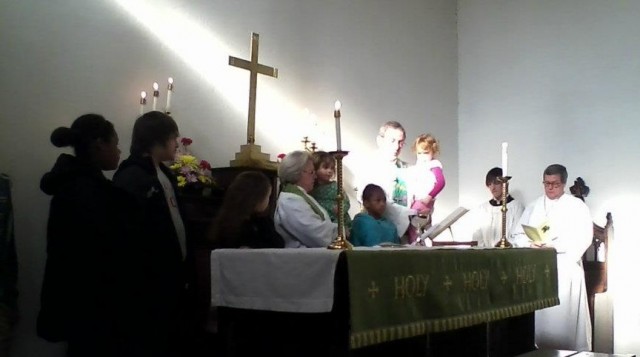
by Mary Jane Wilkie
Often called “the church of the future,” children offer gifts in the here and now, gifts often unrecognized by adults. With attention to children’s spiritual contributions to our lives, we allow them to minister to us.
Human beings are theotropic, that is, we are by nature attracted to God, or to something beyond ourselves. This characteristic shows itself easily in children, for they are aware of God at an early age, although they have yet to develop language to express it. Other characteristics of children—especially very young ones—make them exemplars of spirituality, if we but take the time to notice.
First is that children love to love, and respond readily to expressions of love from others. Second is that they are quick to forgive. If we learn nothing more from children than those two qualities, we will have benefited from their ministry. But they offer more.
Children think about existential issues: life, death, meaning. In seeking answers for themselves, they make ample use of the imagination which, until they begin school, is relatively unfettered.
They find it easy to be in relationship with God, most likely because their mind is not constantly causing them to doubt. Consequently, they are sincere in their prayers, never “faking it.”
Jerome Berryman suggests that young children “intuit divinity,” operating largely in a non-verbal world, or a world where verbal expression is straightforward and devoid of hidden meaning or agendas.
Children are not interested in status. I believe this is one of the characteristics Jesus was pointing to when he proposed a child as model for the Kingdom of God (Matthew 18:3). They are unimpressed by bishops, CEOs of multinational corporations, or presidents of countries. They respond to people as people.
What matters most to children is serious attention to their being, which should prevail in adult relationships, but rarely does. A corollary is that children are more interested in process than product. This means that the experience itself is more meaningful than any concrete object derived from it.
Children are creative with the simplest of objects. Despite what consumer advertising would have us believe, if children have access to basic materials, they will devise all manner of interesting objects, enjoying their fabrication more than the objects themselves.
Lastly, one of the most valuable qualities children and young people contribute to adults is their idealism, their absence of cynicism. I would posit that life’s central challenge is to grow old without becoming a cynic, and children help us in this endeavor.
Whether children continue to serve as ministers as they grow up is governed by the type of guidance they get from us adults. We have all seen children—both younger and older ones—behave in selfish ways, or respond dramatically to external stimuli. Adult response to those situations is crucial to the way children process the elements of their environment. If throughout their growth we nurture them in their faith development, they continue to be hopeful and trusting. They become strong in the confidence that enables them to confront difficulty. They develop awareness of reciprocity among individuals, and are able to articulate increasingly complex observations about their relationships and about the world. They continue to ponder existential questions, talking about them in language derived from the environment that has sustained them. Our response to their qualities and to their being will determine the kind of ministers they and we become.
Suggested reading: Mimi Doe, Ten Principles of Spiritual Parenting.
Robert Coles, The Spiritual Lives of Children.
David Hay, The Spirit of the Child.
Jerome Berryman, The Complete Guide to Godly Play, vol. 1.
Mary Jane Wilkie has been a teacher of children of all ages, and a Sunday-school director, trained in Godly Play. She has given workshops and presentations on music and spiritual topics, and has published articles on children and music (including Episcopal Life), as well as a book, Music from the Trenches, for parents interested in providing strong support for their children’s musical growth.
photo: St John’s Episcopal Church, Columbus, OH (by Jon White)

